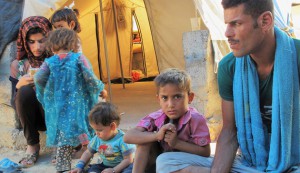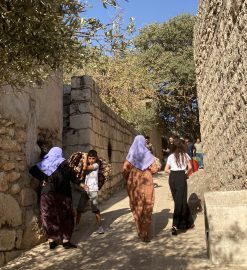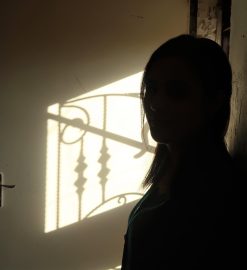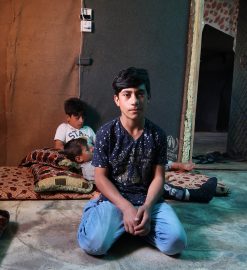Iraqi children traumatized by IS violence

Publication: Al-Monitor
ERBIL, Iraq — Mohammed was 5 years old when August 16, 2015his little brother was shot dead before his eyes. This happened in June 2014 when Islamic State (IS) militants stormed the city of Mosul and took over large parts of northern Iraq.
“IS terrorists shot my child because I was a soldier in the Iraqi army,” Mohammed’s father, a skinny man with deep lines in his face, told Al-Monitor with tears in his eyes. “And after they killed my son, they forced us to leave our home the same day. Money, jewelry, clothing — we had to leave behind everything we had in exchange for our lives.”
Mohammed, his parents and four sisters fled to the Kurdish region in Iraq and now live in the Baharka refugee camp. Ever since their arrival at the camp, Mohammed suffers from war trauma. After his brother’s death, he was unable to speak for more than seven months, and even now he is still afraid to go to school or talk to strangers. “At the slightest provocation, he relives the murder of his brother again,” his parents said.
His father added, “Mohammed also needed surgery on a nerve in his neck. The doctor said there was too much pressure on it, which can be very dangerous.”
Family members and local aid workers told Al-Monitor that children at the Baharka refugee camp in Erbil witnessed some of the most horrible crimes committed by IS. They saw family members killed, religious minorities targeted and extreme violence.
As a result, refugee children in Iraq often suffer from nightmares, anxiety attacks and depression, according to Aram Shakaram, program director of Save the Children Kurdistan.
Shakaram told Al-Monitor that the organization set up several psychosocial programs for children, including role playing, drawing, singing and dancing, which help them deal with war trauma.
“Some children kind of forget what they have been through as soon as they get the feeling that they are safe. Others, however, need specialist help from a psychiatrist, and they may even need medication,’’ Shakaram said.
However, in Iraqi Kurdistan — where approximately 1.5 million Syrian and Iraqi refugees live — mental health care services are severely lacking. Children often do not receive proper psychological care when it comes to dealing with traumatic events.
The next psychosocial program for children starts in October, Shakaram added. “But Save the Children Kurdistan has a tight budget. The focus of NGOs [nongovernmental organizations] lies mainly on providing basic needs, like food, shelter, medical care and schooling.”
Nour, a 9-year-old girl from Mosul who also lives in the camp, is taking tranquilizers to deal with what she has experienced. On good days, she only asks if she can go home, back to Mosul. But on bad days, Nour suddenly starts crying for no reason or screams at night because of the nightmares she has been suffering since her family fled from IS last year.
“Bombings, sectarian violence and the rise of IS — Nour has been through it all, unfortunately,” her mother said. In 2010, Nour also witnessed unknown gunmen murder her aunt. Until this day, nobody knows exactly what happened when two militants showed up at the door and shot her aunt. “That’s just how it went in Iraq. And it still goes on like that. It only became worse,” her mother said, adding that her four other children are also traumatized and need help.
It is not uncommon that NGO workers, through psychosocial activities, find refugee children are severely traumatized. In refugee camps in Dahuk, dozens of Yazidi children, some as young as 6, were asked to draw pictures.
The results were shocking. They did not draw pictures of tents, flowers and dolls. The drew pictures of the misery they had experienced, such as mass executions, beheadings and shackled women being sold at slave markets.
Yazidi children and other minorities who were captured by IS experienced the worst forms of violence, but approximately 14 million children are currently suffering under the escalating conflicts in Syria and parts of Iraq, UNICEF said.
Many children in the region have never known peace. Therefore, UNICEF warns that a whole generation is likely to be lost in the cycle of violence. Traumatic experiences at an early age — especially experiences of persecution and terror — can not only cause post-traumatic stress disorder symptoms, but can also lead to personality disturbances in adulthood.
In August 2014, IS overran Qaraqosh, Iraq’s largest Christian town, forcing thousands of Iraqis to leave their homes. When Akram, father of four, found out that IS militants were on their way, he knew that they did not stand a chance against IS. He was right. As soon as IS arrived in the town, they shot his 20-year-old son, Karkashem. Akram did not want to leave his body behind, but he had no other choice, as he did not want to lose his other children, as well.
“But when we rushed to get out of Qaraqosh, the car wouldn’t start. In a blind panic we decided to run as fast as we could, and after a few miles we found an abandoned tractor and got on the vehicle,’’ Akram said.
The only reminder the family has left of Karkashem is a photograph. In front of their refugee tent, Karar, 12, looks at the picture of his brother. Ever since that day, he has been suffering from depression, as his brother was murdered before his eyes. His sister, Zara, 14, hides inside the tent. She does not want to talk to strangers. Akram told Al-Monitor that they do not know how to deal with their grief.
“We didn’t even tell our daughter Janan, who lives in Sulaimaniyah, what happened to her brother. She loves him so much. This would break her heart,’’ he said.
When asked how he deals with his emotions, Akram says he is depressed, as well. Not only because of the death of his son, but also because he has the feeling that the situation is not getting any better for him and his children. They have nothing left anymore, and they miss their life back home.
Beri Shalmashi contributed to this article.



Leave a Reply